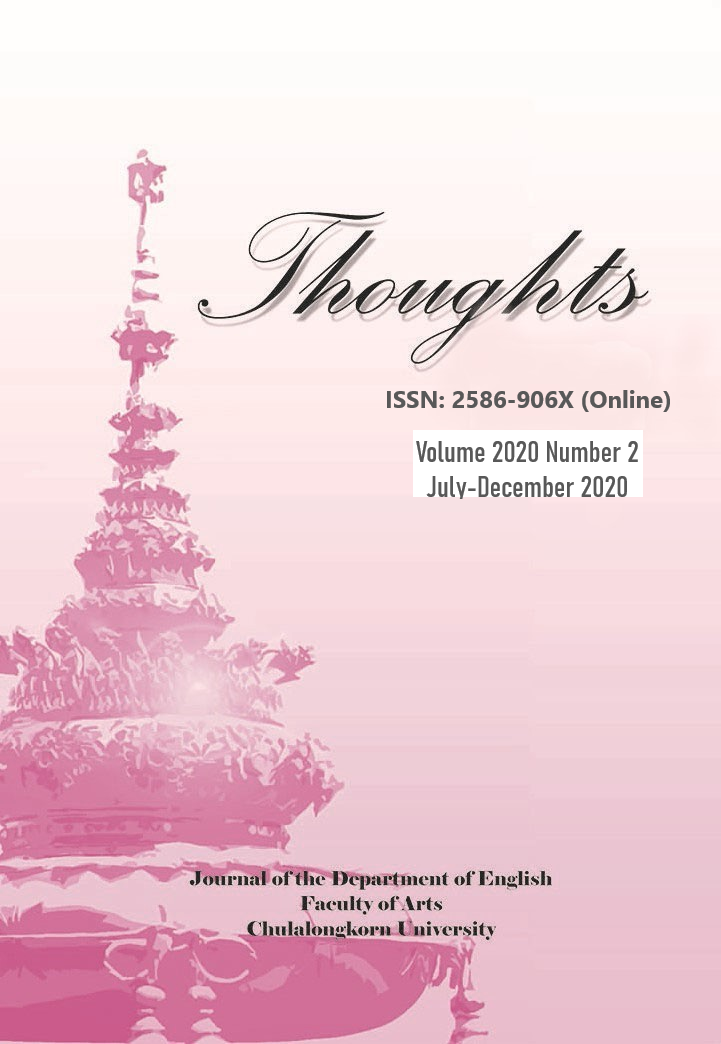How to Write Happy Stories: Michel Faber’s “Vanilla Bright Like Eminem” as a Refutation of Charles Baxter’s Happiness Theory
DOI:
https://doi.org/10.58837/CHULA.THTS.2020.2.4Keywords:
Happiness, Fiction, Literature, Narrative, Michel Faber, Charles BaxterAbstract
Both writers and scholars frequently emphasize the difficulties of writing successful narratives that are expressive of happiness, but detailed and systematic inquiries into the problem are rare. An exception is Charles Baxter’s essay “Regarding Happiness.” It gives eloquent and clear answers to the questions of what makes it so hard to write happy stories that mean something, and how one can write such a story anyway. However, the propositions from “Regarding Happiness” can be challenged. Michel Faber’s short story “Vanilla Bright Like Eminem” can be read as an elaborate refutation of Baxter’s theory, as it is an engaging ‘happy’ story that breaks almost every rule the essay put forward, and contradicts virtually all of its major claims. Showing that—contrary to Baxter—happiness can be communicated in fiction even when the happy character is unable to see or understand it, and that happiness does not need to be highlighted through a successfully completed activity or via contrast with pain, Faber’s short story offers important amendments to Baxter’s opus and thus makes a valuable contribution to the study of happiness and its relation to literature.
References
Baxter, C. (2008). Regarding happiness. In Burning down the house: Essays on fiction (2nd ed., pp. 197-210). Graywolf Press. (Original work published 1997).
Faber, M. (2007). Vanilla bright like Eminem. In Vanilla bright like Eminem: Stories (pp. 239-246). Harcourt.
Hobbes, T. (1981). Leviathan. Penguin. (Original work published 1651)
Jamison, L., & Kirsch, A. (2014, March 11). Is it harder to write about happiness than its opposite? The New York Times. https://www.nytimes.com/2014/03/16/books/review/is-it-harder-to-write-about-happiness-than-its-opposite.html?_r=1
McCrum, R. (2013, May 27). Where is happiness in 20th-century fiction? The Guardian. https://www.theguardian.com/books/booksblog/2013/may/27/happiness-20th-century-fiction
Milosz, C. (2006). Gift (C. Milosz, Trans.). In Selected poems: 1931-2004 (p. 117). HarperCollins. (Original work published 1971)
Watzlawick, P. (1983). The situation is hopeless but not serious: The pursuit of unhappiness. W. W. Norton & Company.
Wayland, N. (2015). Representations of happiness in comedic young adult fiction: Happy are the wretched. Jeunesse: Young People, Texts, Cultures, 7(2), 86-106. https://doi.org/10.1353/jeu.2015.0025
Downloads
Published
Issue
Section
License
Copyright (c) 2020 Thoughts

This work is licensed under a Creative Commons Attribution-NonCommercial-NoDerivatives 4.0 International License.
Copyright by the Faculty of Arts, Chulalongkorn University.
Photocopying is allowed for internal, non-commercial use only. Photocopying for other uses or for purposes other than indicated must be permitted in writing from the Faculty of Arts, Chulalongkorn University.
All views or conclusion are those of the authors of the articles and not necessarily those of the publisher or the editorial staff.


